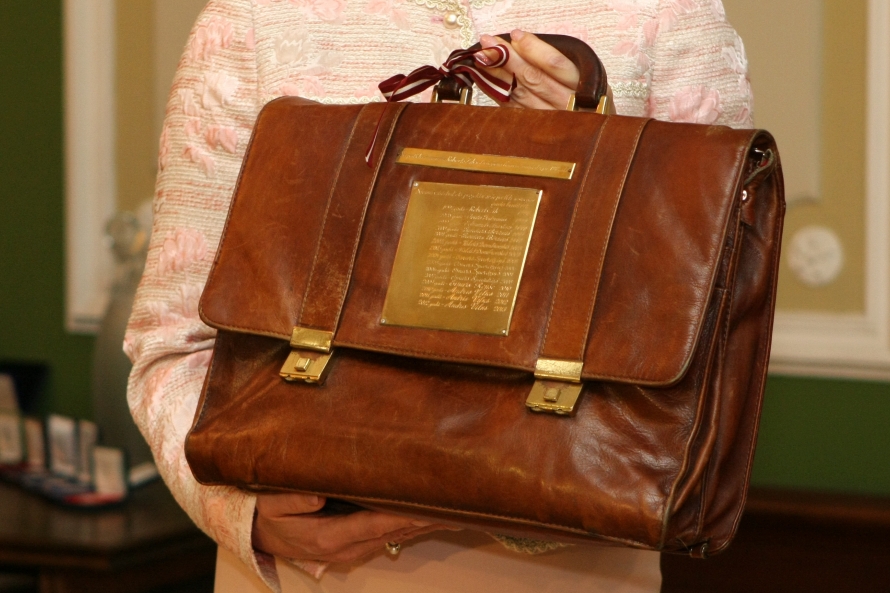In keeping with tradition, the financial and fiscal homework was delivered in a battered briefcase (see note).
The battered budget bag

Carrying a budget portfolio from the Ministry of Finance to the Saeima is a tradition started in 1997 by then-Finance Minister Roberts Zīle. The briefcase is the same one Zīle used back then - hence its well-worn appearance.
A brass plate on the bag recorded the names of each Finance Minister making use of it and the years in which they delivered a budget to Saeima, though this was recently replaced with a new one as the first was full up (it can now be seen fixed on the back of the bag, giving it a rather bulletproof look).
A similar tradition takes place in the United Kingdom when the Chancellor of the Exchequer (the UK Finance Minister) delivers a budget to the Houses of Parliament.
The bag has seen plenty of changes over the years through boom and bust. In the first year it was delivered to the Saeima, the amount of expenditure it outlined was a mere 1.3 billion lats or about 1.8 billion euros. In contrast the 2021 budget expenditure is more than 10 billion euros.
When it arrives at Saeima it typically weighs in at 3 to 5 kilos, depending upon the amount of paperwork inside.
The current Minister, Janis Reirs, will be carrying the portfolio for the fifth time, breaking the record of Finance Ministers Oskars Spurdzins and Andris Vilks who toted the bag four times each.
Only one Finance Minister has abandoned the bag on its annual outing - in 2008 Atis Slakteris was abroad when the budget was delivered. The bag never forgave him for the snub and a massive recession followed.
Speaking on LTV before toting his bag to parliament, Reirs described this as a "cooperative" budget based upon various compromises among the five coalition parties and identified indexation of pensions as well as salary increases for doctors and teachers as key elements of his spending plans. Reirs also claimed that the 2020 budget will reduce social inequality.
In another interview on Latvian Radio, Reirs stated that while members of parliament would as usual have the opportunity to propose budget amendments during the legislative process, he did not see an opportunity to increase budget revenues, so any extra costs would have to be matched by cuts elsewhere.
"There is an opportunity for redistribution, but then you have to find what to cut," the Reirs said.
He also sounded a note of caution by saying that projected economic growth of 2.8% next year is one of the highest when compared, for example, with estimates from the World Bank, the International Monetary Fund, the European Commission and independent experts. Latvia made the forecast in August and the situation in the world economy is "dynamic" he said, hinting that economic growth may stagnate and therefore a cautious approach would be suitable.
The Cabinet of Ministers, at its meeting on Friday, October 11, approved the draft state budget for 2020, as previously reported by LSM.
Revenues are expected to be EUR 9.894 billion next year, with expenditure of EUR 10.002 billion. The budget deficit is planned at 0.3% of GDP, based upon economic growth of 2.8%.
2020. gada budžets ir sadarbības budžets, kas veidots diskusijās. Tā šorīt intervijā @RitaPanorama sacīja @Finmin ministrs Jānis Reirs. https://t.co/PtcTqw9VnK pic.twitter.com/mfjlPYvHMG
— LTV Ziņu dienests (@ltvzinas) October 14, 2019




























